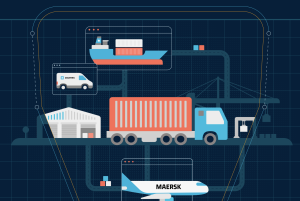 The fourth Industrial Revolution, characterised by a fusion of technologies that is blurring the Iines between the physical, digital and biological spheres, builds on the digital revolution (known as the Third Industrial Revolution) that has been occurring since the 1950’s, said the World Economic Forum.
The fourth Industrial Revolution, characterised by a fusion of technologies that is blurring the Iines between the physical, digital and biological spheres, builds on the digital revolution (known as the Third Industrial Revolution) that has been occurring since the 1950’s, said the World Economic Forum.
‘4IR’ has seen the emergence of technologies in procurement, which are set to disrupt established methods. Examples are cognitive procurement and Blockchain.
Mluleki Ntlemeza (MCIPS), e-Procurement specialist at PetroSA, unpacks the impact of the fourth Industrial Revolution on the future of procurement in this month’s SmartProcurement.
The advent of cognitive procurement
Cognitive procurement applications do the things that were previously only done by human beings. These functions are made possible by – amongst others – speech recognition, object recognition, machine learning and NLP.
For many years, computer scientists have been hard at work trying to make computers match human reasoning. Recent breakthroughs in the field of artificial intelligence realised this dream. Collaboration between computer scientists, neuroscientists and linguists has made it possible for computers to use machine learning, natural language processing (NLP) and big data analytics, to solve business problems.
The magnitude of increased data in organisations – received from internal and external channels in different formats – has made it impossible for humans to analyse, understand and utilise this data in decision making. It is against this backdrop that, IBM – amongst others – developed computers that mimic the neural networks of the human brain – where processing and memory functions are fused. In the traditional computer architecture data is processed in a linear sequence because storage and processing functions are separated.
IBM and SAP partnership
The recent marriage between IBM and SAP Ariba, heralds a new chapter in the world of procurement. The two software giants’ strategic move is ostensibly an attempt to leverage their strengths in the market. IBM’s cognitive application, Watson, and SAP’s Leonardo – packaged on the Ariba platform – are undoubtedly not only going to change the game, but also the playing field.
IBM’s plan to sunset its Emptoris e-Procurement system, and move its customers to the Ariba platform, demonstrates their confidence in this partnership, and the positive spin- offs it will generate.
Necessitated by the repetitive nature of some tasks, procurement automation is more likely to take place in the tail-end spend, high volume and noisy category areas. The use of robots (digital assistants) in the P2P processes will definitely relieve procurement staff from the rote tasks, so that they may focus on more strategic roles such as negotiation, supplier relationship and category management.
Although the internet, and globalisation, have had positive spin-offs in supply chain management, these spin-offs have been accompanied by business risks, which made it humanly impossible to monitor and manage owing to the increasing amount of data. Data analytics will alleviate this problem, and augment decision making.
Bitcoin and Blockchain
For years businesses have been practicing procurement in their private networks, and verifying the source of the transaction to prevent the retroactive alteration of records. The digital currency, Bitcoin, and digital ledger technology Blockchain are going to alter the way procurement is practiced, as they mitigate – not only the financial risks -but other supply chain risks such as transparency on what goes into a product.
Bitcoin is a type of digital currency in which “encryption techniques are used to regulate the generation of units of currency, and verify the transfer of funds, operating independently of a central bank.” Blockchain is “a digital ledger in which transactions made in cryptocurrencies (like Bitcoin) are recorded chronologically and publicly.”
Blockchain is immutable – that is – once data is written in it, data cannot be changed; not even by the system administrator. This promotes data integrity for audit purposes, and this level of data security will over time build trust in, and reliance on, the system.
Amazon e-Procurement
Though Amazon does not use Bitcoin and Blockchain yet, the recent launch of their e-Procurement system perhaps presents a glimpse of what the future may look like. This B2B e-marketplace offers the same shopping experience as their consumer counterpart. Amazon reaches different types of enterprises, ranging from sole traders to large corporations. These suppliers are vetted by Amazon, and buyers have access to the management function where they can – among other things – conduct a spend analysis.
The question is, will these automated changes in the procurement space act as a springboard that will catapult procurement to the C-suite? Will procurement survive with the current skillset?

























